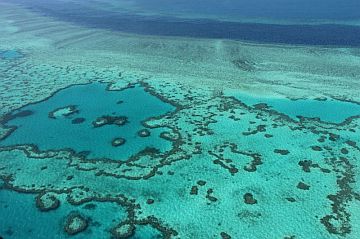
An aerial view of the Great Barrier Reef.
/AFP
Australia’s Great Barrier Reef may never recover from last year’s warming-driven coral bleaching, said a study that called for urgent action in the face of ineffective conservation efforts.
Record-high temperatures in 2015 and 2016 drove an unprecedented bleaching episode, which occurs when stressed corals expel the algae that live in their tissue and provide them with food.
Bleached coral is more susceptible to disease, and without sufficient time to recover — which can take one decade or several depending on the species — it can die.
For the new study released late Wednesday, an Australian-led team examined the impact of three major bleaching events — in 1998, 2002 and 2016 — over the reef’s entire 2,300-kilometer length.
In 2016, they found, the proportion of constituent reefs experiencing extreme bleaching was over four times higher than in the two previous episodes.
Only nine percent escaped bleaching altogether, compared with more than 40 percent in 2002 and 1998.
“The chances of the northern Great Barrier Reef returning to its pre-bleaching assemblage structure are slim given the scale of damage that occurred in 2016 and the likelihood of a fourth bleaching event occurring within the next decade or two as global temperatures continue to rise,” the team wrote.
Earlier this month, researchers warned that the reef was already experiencing an unprecedented second straight year of bleaching.
Local reef protection “affords little or no resistance” to extreme heat, the researchers wrote in the journal Nature./AFP
Disclaimer: The comments uploaded on this site do not necessarily represent or reflect the views of management and owner of Cebudailynews. We reserve the right to exclude comments that we deem to be inconsistent with our editorial standards.
